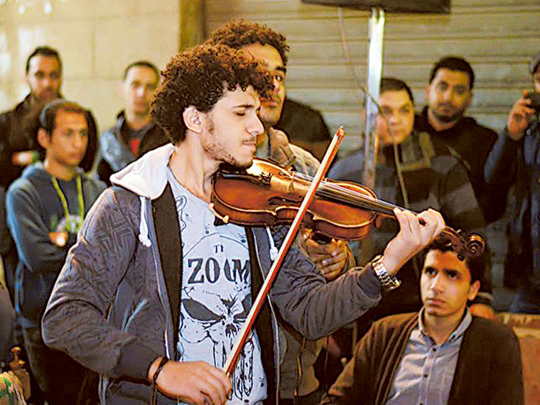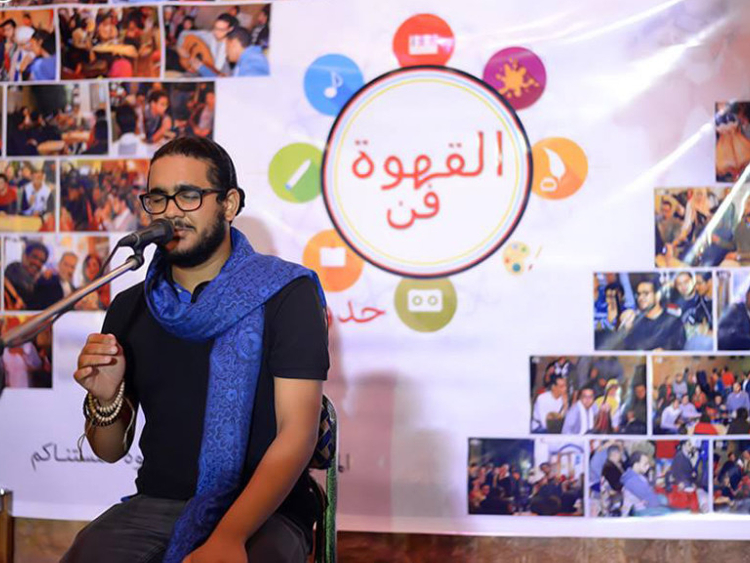
Cairo: When Egypt’s name is mentioned, the Pyramids may be the first to come to the mind. But the country’s bustling coffee shops are an allure for locals and foreign visitors alike.
With their proliferation in working-class areas and upmarket quarters, cafes are seen as a magnet that break class barriers.
To Mustafa Sulaiman, no other place can be better for young talents to reach out to the public.
Sulaiman is a co-founder of ‘Al Kahwa Fann’ (Art Cafe), an initiative that he launched with three colleagues in 2014 with the aim of bringing different kinds of art for free to the general public right where they sit: at cafés.
“Street culture thrived during the days of the revolution,” Sulaiman said, referring to the 2011 uprising that toppled long-time president Hosni Mubarak. “But after the revolution and as life has become increasingly hard for people, a gap has returned between intellectuals and the ordinary people. Therefore, we thought of our initiative, the aim of which is to bridge the gap between the two sides and re-integrate culture into society by holding cultural activities at cafes in the presence of their clients,” he told Gulf News in an interview.
The group’s mission statement is to encourage gifted young people to come up and present their artistic talents to the public.
Over the past two years, Al Kahwa Fann has given the chance to dozens of young people to show their talents in music, painting, literature, stand-up comedy and recitation of the Quran.
“We encourage the talented people to interact with cafe customers without any restrictions from our side. We try to be a means for talented people to get public attention,” Sulaiman said.
The group made its debut in July 2014 with an event at a coffee house in central Cairo. But the start was not easy because cafe owners were reluctant to host any event that could be used to cover up illicit political activity, as Sulaiman remembers.
“The biggest problem was to convince owners of coffee shops to allow us to use the places for one or two hours to present the event. In the beginning, we faced rejection from most owners of cafes. Prospects brightened when one café proprietor got convinced of our idea. But hardly had we started the event when police arrived and ended it.”
Since its emergence, Al Kahwa Fann, which now comprises 12 members, has arranged 12 events in four Egyptian cities: Cairo, Alexandria, the Delta province of Menufia and Minya in Upper Egypt.
“During these sittings, we have hosted prominent publishers, writers and musicians, who attended in support of the talented performers in their own fields.”
The sky’s the limit to Sulaiman and his colleagues, though. “We have an ambition to take our initiative to all [27] governorates of Egypt. Talents outside Cairo are impressive, but they need light to be shed on them,” Sulaiman, himself a writer, said.
“I hope that there will be an official agency that will take care of cultural initiatives and provide facilities, including easing access to security permits.”
Egyptian authorities have heavily restricted public rallies without prior police approval after disruptive street protests staged by backers of Islamist president Mohammad Mursi whom the army deposed in 2013 following massive protests against his rule.
“We still face several obstacles such as a shortage of financial resources as we depend on self-financing. We also find it hard to get security approvals for holding our activities,” Sulaiman said.
Still, he is hopeful about the future.
“During our 12 events, the numbers of attendees and their response have been increasing and encouraging,” Sulaiman added.
Earlier this year, the group arranged activities at the Cairo Book Fair — a prestigious annual cultural festival. Another key event was held in Al Mouez Street in Islamic Cairo on the group’s first birthday. Both events were a crowd puller.
“An unexpected large number of people showed up for the sitting in Al Mouz Street. This prompted the district’s police station to send a security unit in order to maintain order,” recalled Sulaiman.
Coffee houses in Egypt have long been associated with culture. But in recent years, they have become haunts for smokers and the jobless seeking to while away their time.
“In the past, great people like Naguib Mahfouz used to sit at the cafe and mix with people,” Sulaiman said, referring to Egypt’s Nobel Laureate writer who died in 2006.
“Mahfouz soared to universal fame through his interaction with people in the street. So, we seek to remove the barrier between intellectuals and people by encouraging them to sit with people and show their talents.”













